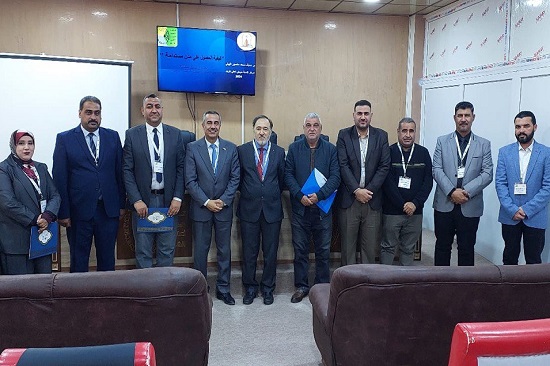| News Details |
Scientific symposium entitled: (The Road to Sustainable Urban Cities)
2024-12-03

In implementation of the directives of the Ministry of Higher Education and Scientific Research to hold the activities of the Global Entrepreneurship Week for the academic year 2024-2025, and in continuation of scientific activities and events, and under the generous patronage of the President of the University of Anbar, Prof. Dr. Mushtak Talib Al-Neda, the Upper Euphrates Basin Developing Centre, in cooperation with the Department of Reconstruction and Projects at the Presidency of the University of Anbar, held a scientific symposium tagged: (The Road to Sustainable Urban Cities), which was held on the central hall of the Centre’s building, on Tuesday, 3/12/2024. The symposium included three lectures presented by a group of researchers from the Upper Euphrates Basin Developing Centre, the first lecture came by Prof. Dr. Isam Mohammed Abdulhameed, which was about: water and energy harvesting villages in dry areas and the establishment of environmentally friendly green villages designed on the basis of investing all the rainwater they receive with the recycling of water from homes and state departments, and producing renewable energy of various types such as solar energy, wind energy, bioenergy, underground energy and others, with the cultivation of trees and plants that work on Adapting the environmental conditions of the target areas, reducing the emission of Reducing carbon dioxide emissions, adapting to drier climates, and focusing on the need to introduce smart agriculture concepts, especially in scheduling farm irrigation based on climate data, satellites, moisture sensors and soil stresses, and the most important specifications of the sustainable home and the sustainable village were highlighted.
The second lecture was presented by the teacher, Dr. Haneen Shartouh Sharqi, which revolved around the future prospects of urban agriculture and its importance, which aims to exploit the available resources and unused spaces in cities from empty land, whether those (private) inside homes (or public) gardens, or between buildings, or in hospitals, schools and roadsides, to grow vegetables and various food crops, and may include other activities for food production such as poultry and animal husbandry, fish farming, and others, either for the purpose of providing food. Fresh and healthy for city dwellers, or as an income-generating activity, which serves as a social safety net for the poorest classes, as it provides employment opportunities and provides part of the population's need for food. The third and final lecture was presented by Assistant Lecturer Saif Sa’ad Mansour, which was about the steps to establish sustainable cities, emphasizing the prior planning of urban cities before their establishment and the use of modern technologies, taking into account the creation of environmentally friendly alternatives in the establishment of sustainable urban cities.
At the end of the seminar, which was attended by a group of researchers and teachers from different sectors of the university, the door was opened for discussions that enriched the value of the scientific materials that were presented by the lecturers, and read the most important recommendations that everyone seeks to achieve and take them into account by opinion and decision-makers.
#Upper_Euphrates_Basin_Developing_Center













